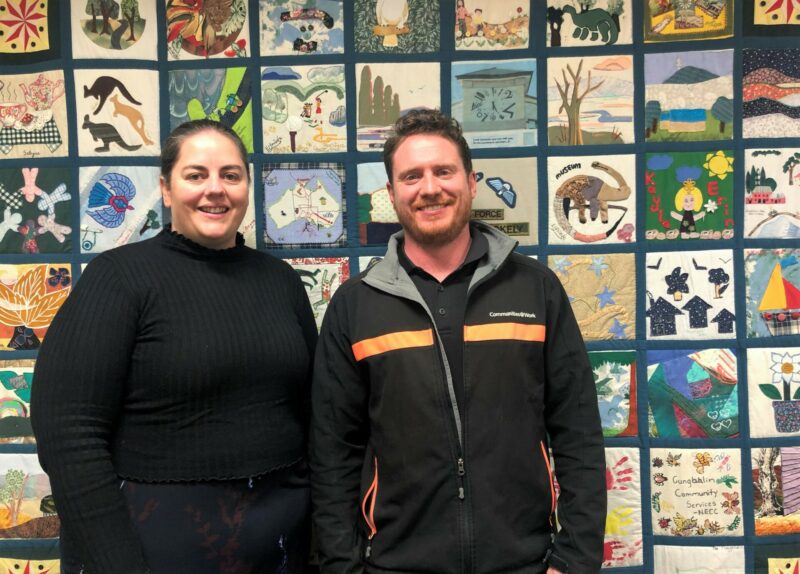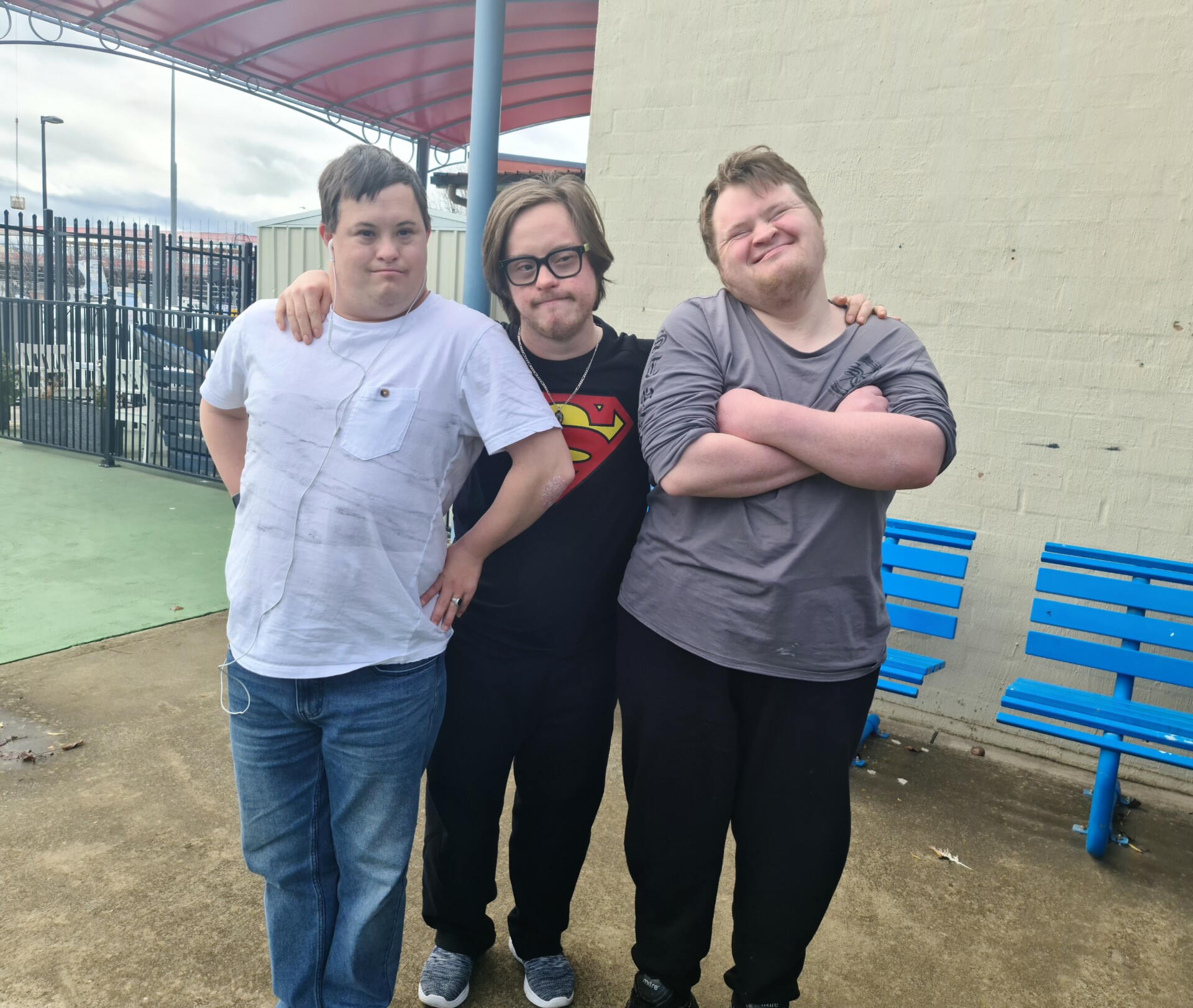Rogan Kilbey was a member of the Disability Programs Team at Communities@Work for eight years. Now, as we bid him goodbye and wished him all the best for a new chapter in his career, we sat down with him one last time to have a chat about his incredible journey with us!

Q: What does your role look like with Communities@Work?
As the Disability Operations Coordinator, I basically oversee the day to day operations of our in-centre disability programs. My responsibilities align with our focus on independent living skills and goal–orientated skills development. As a whole of life organisation, this includes our Malkara School Holiday Program for primary school–aged children with disabilities, our teens‘ programs (for people aged 12-18) – school holiday programs and teens after school care, as well as young adults and adults programs for people aged 18 and over.
Q: What is it that you most enjoy about your work?
The best part about my role is all the connections that I built with people over the years. And the contributions I’ve made to help people achieve their goals. It’s always really, really lovely to see someone come in with an idea of where they’d like to go with their life, something they’d like to achieve and then breaking that down into small goals and seeing them gradually achieve it, putting those bits and pieces together into something really, really big.
Q: How would you describe disability work?
First off, I‘d say it is most definitely a career. I don’t think enough people think of it like that. They tend to see working in disability as just a stopgap between other opportunities, whereas it is a really, really viable career in itself. There’s so many different roles, so many different things you can do, so many people you meet, so much variety, so much you can learn, and so much you can achieve! It is really a fulfilling career that fosters so much professional and personal development and has so many opportunities.
Q: Tell us a bit about your team and the work environment.
The teams are fantastic. They’re very varied. There are lots of different people from lots of different walks of life. I think most of them get into the job because they’re looking to make a difference. Even at after-school care and school holidays, the focus of our programs is to teach life skills. And our work environment makes that fun. We have a lot of fun in the day to day, lots of different activities happening, whether it’s in-centre or in the community. We also get the opportunity to share some of our own skills, some of our own passions.
And it‘s fantastic to see all the different team members and even the different teams come together in this one big happy and fun bubble. From a management perspective, too, it‘s very supportive. I‘ve always felt that everything I‘ve asked to do, they‘ve not only supported me in it but even facilitated it where needed.
Q: So what would you say is the biggest positive of working with Communities@Work?
For me, the thing I‘ve really enjoyed and appreciated about working with Communities@Work is how supportive the management team has been around my professional development. Ever since I made it known that I wanted a career in the disability sector, they pretty much gave me every opportunity to progress and succeed in my career.
For instance, early on, when I first started out as a disability support worker, it was identified that maybe I wanted to learn more about what being in that role meant. And so the organisation supported me to apply for a scholarship through the ACT Government at that stage, which continued on with a traineeship at CIT, doing my Cert IV in disability. And then, from there, I did a double Diploma in disability service coordination and disability services. Most recently, I’ve started my diploma in leadership and management. As part of my professional development plan, I identified it as a skills area that I wanted to build upon as an operations coordinator, and I was wholly supported to go ahead with it.
In addition to that, there have been tons of smaller training throughout the year, whether it’s first aid training, food safety, supervisor training, fire safety, work health safety. Really, the sky’s the limit on the different opportunities for training and professional development related to the role, and I‘ve just been so grateful to the organisation for helping me achieve what I wanted to every step of the way.
Other positives also include flexible working hours, which was really important to ensure a work-life balance, and the passionate people you meet from different areas across the organisation who‘re all working for the community, which just helps you grow as a person.
Q: What have been some of the most memorable moments of your time here at Communities@Work?
There have been so many in the past eight years, and I think the most significant ones were those that made me smile because I made others smile and the constant positive feedback. For example, people‘s smiles when they see me and their eagerness to work with me and helping them progress towards their goals are always memorable. Then, there are the bigger things at the end of the year when you hear back from families, or when a client’s managed to reach a milestone in their life that you’ve been a part of, and they just want to share that positive experience with you.
Most recently, it’s been leaving the role and getting lots of kind messages from people, reflecting on the eight years that I’ve known them for and supported them. Some of the positive feedback that I remember the most was from a family related to their young person with some challenging behaviours. We worked collaboratively with them to address those issues and got them to a stage where that was no longer an issue. And the way we were able to support them through that process has had really long and positive impacts on many different parts of that person’s life, not just their time with us, but their time at home, their interactions with others, and their participation in school, everything.
Q: Any parting comments before we say goodbye?
Making the decision to leave and take that next step in my career was one of the hardest decisions that I’ve made. Yet, everyone has been really, really supportive of it. I would just like to say that the past eight years at Communities@Work in the Disability area have been rewarding, challenging, exciting, varied, and incredibly supportive. I really look forward to the opportunity to have interactions with the organisation in the future and the potential to someday maybe come back and work for Communities@Work again.

Three young adult disability clients – Communities@Work
Final Thoughts
Thank you, Rogan, for sharing your beautiful story with us! We wish you all the best in your future endeavours and hope you stay in touch. You‘ve made an impact not only in your team but in the broader program area and, most importantly, your clients. We will miss you!
Watch a snippet of Rogan’s interview below:
